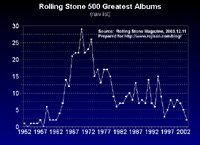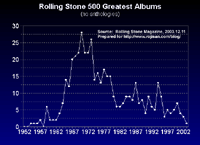about a month ago, i ran into this story over that the christian science monitor – the death of the album.
at the time, i thought i’d make some brilliant and insightful comments about how it’s a singles-driven market and the album is usually an artificial creation that doesn’t really have any integrity with the listeners, but it wasn’t something i could really get my teeth into.
when i got the “good news” from peter lowe over at apple, speaking at music 2.0, i dug into the “drafts” (that is, reminders) and realized i’d left it hanging. i won’t make you dig for this one, because it’s worth repeating.
The music store from Apple, iTunes, says that of the more than 17 million songs purchased since April, about 46 percent were downloaded as part of full albums.
Apple director of marketing Peter Lowe said that 45 percent of songs downloaded through iTunes had been sold as part of a full album, rather than in single song form. That indicates many people are still interested in purchasing large numbers of songs, or full albums, despite having a la carte options, Lowe said.
when i did this before, the assumption was 12 tracks per album (which is just a guess, really) – and i’ll use it again. since i’ve got two data points from itunes, i can do a little more.
based on the csm statement:
46% of 17m = 651,667 albums + 9.18 million singles. (6.63% of sales are albums)
based on the music 2.0 statement:
45% of 20m = 750,000 albums + 11 million singles. (6.38% of sales are albums)
that’s a 15.1% increase for album sales, and a 19.8% increase for singles sales. personally, i expect that gap to continue to widen.
my spin is already on the record (as it were). while that statement was directed at the high end of the music market, i think the concept holds from top to bottom.
as a musician, what you’re creating is a song that captures a tiny piece of that brutal attention market. it’s about getting some attention and building a relationship on top of it. that’s something that an album can do, but it’s not the only way, and it doesn’t work for that many artists. when it works, the single gets your foot in the door, and the album makes it a relationship. once it’s a relationship, it’s yours to lose (for example, by getting busted for lipsynching your whole career).
the problem for many artists is that the pressure to get something “out there” means that a few good tracks are bundled with a bunch of not-so-good tracks and called an album – it’s got 12 tracks, so it’s an album – but it doesn’t work like one. if your audience starts telling their cd player to skip track 2, then track 2 and 3, then 2 and 3 and 6 – you’re not building a relationship, you’re annoying your people.
yes. that kind of album is dead.
But what constitutes an album’s worth of music might also change as artists, freed from the restrictions of a 70-minute CD, could make their collections longer or shorter. If a band only has 20 minutes of good songs, then it doesn’t have to pad out the material.
that i don’t get. i just don’t see how “the restrictions of a 70-minute cd” preclude producing a 20-minute cd… i think the economics have shifted enough that producing a cd with 20 minutes of solid material is the way to go. it’s a very rare artist that can put together 70 minutes of quality material, let alone something that would only be possible once “freed” from the cd.
the csm article couples the death of the album format to the physical format. it’s probably obvious by now that i think that the cd will be with us for a while, so i don’t make that connection. the album was created as soon as a physical format made it possible, and for the subset of artists that can do 10 or more songs and make it coherent and use it to build relationships, the album will remain too.
technology companies and record labels have a great interest in coming up with new formats for delivering music – new formats mean new equipment and repeat sales (buy it on 8-track, buy it again on vinyl, buy it again on cd…).
the package matters to the industry, but not so much to the audience. we’ve seen cylinders and platters and tape and optical – 78s, 45s, lps (1948ish), reels, cassttes (1965ish), elcasette (1977ish), playtape (1967ish), dcc (1992ish), 4-track (1956ish), 8-track (1966ish), minidisc (1993ish), and dat (1984ish). we’re still doing it with superaudio cd and dvd-audio peeking over the horizon – plus the hundreds of other formats that have been cooked up in labs and never made it out. we just want something that will put the sounds we like into our ears.
update (8:22pm): i found this post over at arstechnica suggests that at least at the top of the market, it’s closer to 14 tracks per album. thankfully, that means my 12-per-album figure was generous.
based on the csm statement:
46% of 17m = 558,571 albums + 9.18 million singles. (5.74% of sales are albums)
based on the music 2.0 statement:
45% of 20m = 642,857 albums + 11 million singles. (5.52% of sales are albums)
update (2003.12.12): a different perspective on the phenomenon (my own follow-up based on different data).
update (2003.12.13): i should point out that “album” apparently originated with a collection of 78s, bound in a book format – hence the name and the legacy.
for more on the subject… from the people…
stefan doroschuk
clay shirky
richard hyett (it’s the comment that counts)
paul mcaleer
kevin white
dana blankenhorn
augie deblieck jr
brian w. doss
james guthrie
and from the media….
forbes
usa today
fox
salon [wants your money]

